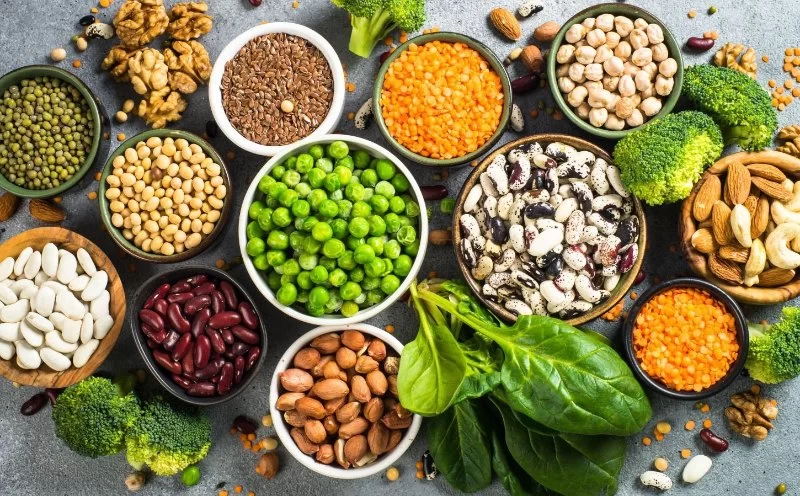Protein Sources for a Heart-Healthy Diet: Plant vs. Animal
- Understanding Protein and Its Role in Heart Health
- The Benefits of Plant-Based Protein for Heart Health
- Animal-Based Proteins and Their Impact on Heart Health
- How to Incorporate Both Plant and Animal Proteins for Heart Health
- Real-Life Stories: How a Heart-Healthy Diet Made a Difference
- Why HeartCare Hub is Your Best Resource for Heart-Healthy Diets
Understanding Protein and Its Role in Heart Health
Protein is a vital macronutrient that plays a crucial role in building and repairing tissues, making enzymes and hormones, and supporting overall health. When it comes to heart health, protein is especially important as it helps maintain muscle mass and supports the body's immune system. However, the type of protein you consume—whether plant-based or animal-based—can have a significant impact on your heart health. It’s essential to understand how different protein sources affect cholesterol levels, blood pressure, and overall cardiovascular function.
The Benefits of Plant-Based Protein for Heart Health
Plant-based proteins, derived from sources like beans, lentils, tofu, and nuts, are considered heart-healthy because they tend to be lower in saturated fats and free from cholesterol. Consuming more plant-based proteins has been shown to lower the risk of heart disease, reduce LDL (bad) cholesterol, and improve overall blood vessel function.
Some of the best sources of plant-based proteins include:
- Legumes: Beans, lentils, and peas are excellent protein sources, rich in fiber, which helps reduce cholesterol levels.
- Tofu and Tempeh: Made from soybeans, these plant-based protein sources are full of heart-healthy compounds like isoflavones, which have been linked to reduced heart disease risk.
- Nuts and Seeds: Almonds, walnuts, chia seeds, and flaxseeds are high in protein and healthy fats, which support heart health and reduce inflammation.
Incorporating these plant-based proteins into your diet can also help manage weight, as they are generally lower in calories compared to their animal-based counterparts.
Animal-Based Proteins and Their Impact on Heart Health
While animal-based proteins from meat, poultry, eggs, and dairy can provide essential amino acids for body functions, some types are higher in saturated fats, which can raise cholesterol levels and contribute to heart disease. For example, red meat and processed meats have been linked to higher risks of cardiovascular problems.
However, not all animal proteins are created equal. Here are some protein sources and their effects on heart health:
- Lean Meat (Chicken, Turkey): Skinless poultry is a better option as it contains lower saturated fat than red meats like beef and pork. It's a good source of protein but should be consumed in moderation.
- Fish: Fatty fish like salmon, mackerel, and sardines are rich in omega-3 fatty acids, which are known to reduce inflammation and improve heart health. Omega-3s can lower blood pressure and reduce the risk of heart disease.
- Dairy Products: Low-fat dairy products such as yogurt and cheese provide protein and calcium. However, it's important to choose low-fat or fat-free options to reduce saturated fat intake.
When incorporating animal-based proteins, it’s vital to focus on lean cuts of meat, choose fish high in omega-3s, and avoid processed meats, which can have a negative impact on heart health.
How to Incorporate Both Plant and Animal Proteins for Heart Health
The key to a heart-healthy diet is finding the right balance of plant-based and animal-based proteins. Here are some tips for incorporating both into your diet:
- Mix Plant and Animal Proteins: Consider incorporating both types of protein into your meals. For example, you can add beans or lentils to a chicken or fish-based dish to increase the amount of fiber and reduce saturated fat.
- Focus on Lean and Plant-Based Proteins: Opt for lean animal proteins like skinless poultry and fatty fish while also adding plant-based sources like beans, legumes, and tofu to your diet.
- Control Portion Sizes: While animal proteins can be part of a heart-healthy diet, it’s important to keep portion sizes moderate and avoid large servings of red meat or processed meats.
- Experiment with Meatless Meals: Try a couple of meatless meals each week, such as a vegetable stir-fry with tofu or a quinoa and bean salad, to add variety and plant-based protein to your diet.
By incorporating both types of protein in appropriate amounts, you can enjoy a variety of flavors and nutrients that support a healthy heart.
Real-Life Stories: How a Heart-Healthy Diet Made a Difference
Many people have experienced the positive effects of a heart-healthy diet that includes both plant and animal proteins. For instance, Mark, a 45-year-old from Texas, decided to make dietary changes after his doctor recommended lowering his cholesterol. He incorporated more plant-based proteins like lentils and quinoa into his meals and switched to lean cuts of chicken and fish. Within three months, Mark saw a significant improvement in his cholesterol levels, and he felt more energetic and healthier overall.
Similarly, Susan, a 55-year-old from Florida, embraced a heart-healthy diet rich in fatty fish and legumes after her family history of heart disease became a concern. By reducing her intake of processed meats and focusing on omega-3-rich fish and plant proteins, Susan not only improved her heart health but also lost weight and felt more confident in her lifestyle choices.
Why HeartCare Hub is Your Best Resource for Heart-Healthy Diets
If you’re looking for guidance on choosing the best protein sources for a heart-healthy diet, HeartCare Hub is the ideal resource. Our website provides expert advice on creating balanced, heart-healthy meal plans, along with tips on incorporating both plant-based and animal-based proteins into your diet. Explore delicious heart-healthy recipes and nutritional tips that support your cardiovascular health. Visit HeartCare Hub today to learn more and start your journey toward better heart health.





















